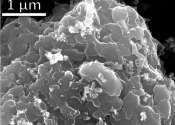Van Life 2.0: Dutch students' road trip in solar mobile home
A group of Dutch students has reimagined van life and is hitting the road to Portugal. Just don't call their groundbreaking new solar-powered vehicle a campervan.
Sep 25, 2021
4
253
Engineering

A group of Dutch students has reimagined van life and is hitting the road to Portugal. Just don't call their groundbreaking new solar-powered vehicle a campervan.
Sep 25, 2021
4
253
Energy & Green Tech

Lithium-ion batteries are currently the preferred technology to power electric vehicles, but they're too expensive for long-duration grid-scale energy storage systems, and lithium itself is becoming more challenging to access.
May 31, 2022
0
512
Engineering

Researchers from the University of Glasgow have developed a new type of heat pump, a flexible heat pump technology, which could help households save on their energy bills and contribute towards net-zero emissions goals.
Aug 1, 2022
5
1929
Energy & Green Tech

Scientists led by an Oregon State University researcher have developed a new electrolyte that raises the efficiency of the zinc metal anode in zinc batteries to nearly 100%, a breakthrough on the way to an alternative to ...
Mar 27, 2023
3
164
Energy & Green Tech

In the first evaluation of evaporation as a renewable energy source, researchers at Columbia University find that U.S. lakes and reservoirs could generate 325 gigawatts of power, nearly 70 percent of what the United States ...
Sep 26, 2017
9
1048
Energy & Green Tech

A nagging question as the year gets closer to the very end. The wind is there. The water is there. The sun is there. How is it that we are still so far off in fossil-fuel land? Farms, plants, rigs later, those in the renewables ...
Energy & Green Tech

Hydrogen is viewed as a promising alternative to fossil fuel, but the methods used to make it either generate too much carbon dioxide or are too expensive. Rice University researchers have found a way to harvest hydrogen ...
Sep 14, 2023
0
152
Energy & Green Tech

During a power outage or after a disaster, it is hard to beat the simplicity of a diesel generator. Just supply fuel and start it up—so easy, anyone could do it. Renewable microgrids, on the other hand, are not so simple, ...
Sep 30, 2022
0
119
Robotics

When electronics need their own power sources, there are two basic options: batteries and harvesters. Batteries store energy internally, but are therefore heavy and have a limited supply. Harvesters, such as solar panels, ...
Apr 14, 2020
9
3830
Energy & Green Tech

Since the Industrial Revolution, the environmental impacts of energy have posed a concern. Recently, this has driven researchers to search for viable options for clean and renewable energy sources.
Jan 28, 2020
1
1861
Energy development is the ongoing effort to provide sufficient primary energy sources and secondary energy forms to fulfill civilization's needs. It involves both installation of established technologies and research and development to create new energy-related technologies. Major considerations in energy planning include resource depletion, supply production peaks, security of supply, cost, impact on air pollution and water pollution, and whether or not the source is renewable.
Technologically advanced societies have become increasingly dependent on external energy sources for transportation, the production of many manufactured goods, and the delivery of energy services. This energy allows people who can afford the cost to live under otherwise unfavorable climatic conditions through the use of heating, ventilation, and/or air conditioning. Level of use of external energy sources differs across societies, as do the climate, convenience, levels of traffic congestion, pollution, production, and greenhouse gas emissions of each society.
Expanding human populations generally require an increased consumption of and dependence on external energy sources. Research, development and practice of energy efficiency and conservation by the populace allows a degree of mitigation of this dependence. Wise energy use embodies the idea of balancing levels of human comfort and energy consumption by researching and implementing effective and sustainable energy harvesting and utilization measures.
This text uses material from Wikipedia, licensed under CC BY-SA